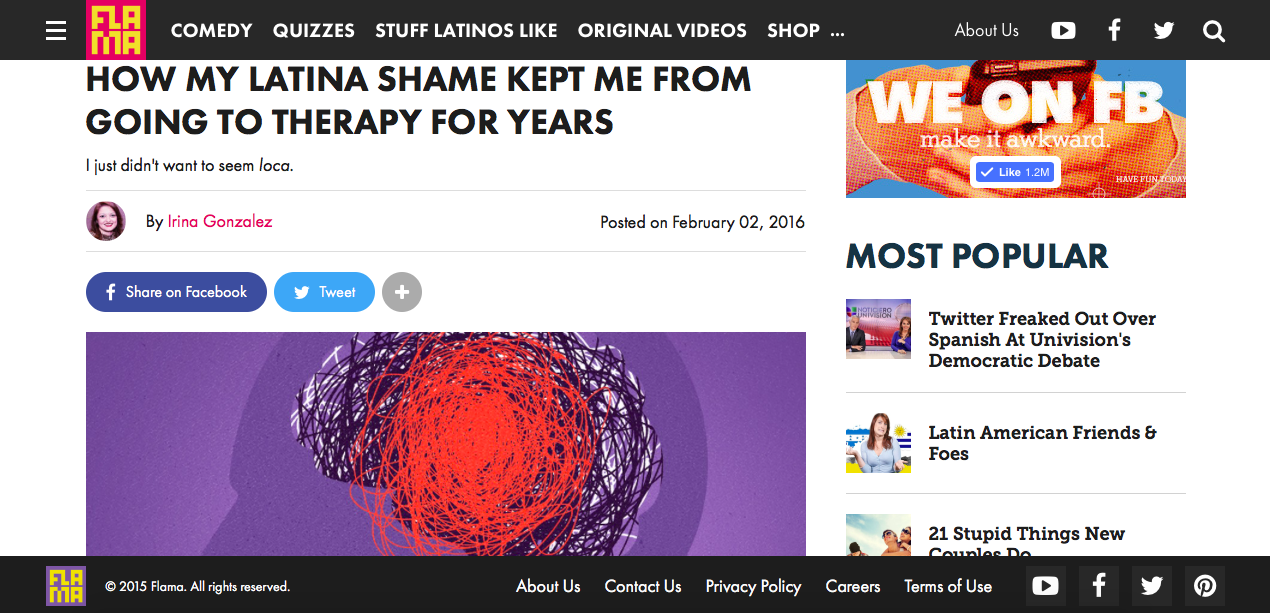Note: This is 1 of 3 essays that was written for and published on The Flama last year. However, the site has since shut down (mostly) and my essay has disappeared… But the internet gods allowed me to find it in its entirety, so I am re-posting it here since a) it was fun to write & b) it’s an important topic to talk about. Enjoy!
Mental health is a difficult issue for anyone to talk about, but it has been especially difficult for me as a Latina. I didn’t grow up in a household where mental health issues were ever discussed, and many of us do almost anything else instead of going to therapy.
I used to be be just like you, avoiding therapy at any cost. I would prefer to drink gallons of té de manzanilla than admitting to the fact that I had some issues I needed to work on with a professional. That would make me loca, wouldn’t it? And I would never admit to being crazy.
Instead, for years I leaned on friends and family with all of my problems, I had an extra glass of wine (or three) when I was feeling particularly stressed, I danced and I ate and I even cleaned my kitchen until it sparkled — anything to avoid actually talking about the issues that concerned me. Issues that deep down I knew were something that I couldn’t solve on my own, but doing it all on my own was what I tried year after year after year.
It turns out I am not alone. According to the American Psychiatric Association’s Office of Minority and National Affairs, fewer than 1 in 11 Hispanics with a mental disorder contact a mental health specialist while fewer than 1 in 5 contact a general health care provider.
The truth is I didn’t grow up hearing much about mental health. Although my family isn’t very religious and are big believers in Western medicine, mental health issues were never discussed. There was always an air of “it’s not okay to talk about this,” and so we never did. The only time I remember it even coming up as I was younger was when my parents and I went to family therapy to deal with issues that had nothing to do with anyone’s mental health (primarily, my coming out as bisexual).
It was years before I thought about mental health as an option. After college, and as I went into the workforce and my stress and anxiety became apparent, I started to notice how some of my white friends (for lack of a better term) embraced therapy. One of my best friends had been seeing a therapist for years and raved about the experience, while others started to deal with depression due to various life circumstances and seeing a therapist seemed to be helping them.
After getting over my initial shock that not only were my non-Latino friends going to therapy but also openly sharing about their positive experiences, I started to think that maybe this is something I should consider doing too. But my guilt and shame over admitting that I needed some help kept me from making any changes for many years.
As I grew in my life and career, my stress and anxiety kept getting worse. I didn’t know how to deal with all of it because I had never learned how to talk about it properly or how to manage my anxiety. Finally, when it reached a breaking point earlier last year, I got up my courage and sought help. And it’s the best thing I have ever done.
Since then, I found a reliable therapist that I truly enjoy visiting every week. We spend our sessions talking about all of the things that I already talk about with friends and family, except now I have a professional who helps me to see things differently, clarify my thoughts and feelings on the situation and who helps me to set goals to better myself.
And that’s what it all comes down to, isn’t it? Bettering oneself.
I’m now thrilled to report that I am happier than ever and doing better every day. My family is on board and supportive, and my friends have seen a real difference in my demeanor.
Since starting therapy, the number one thing I learned is that we all could use someone professional to talk to. It’s lovely to have friends and family to depend on, and I still certainly do, but it’s not the same as an outsider who can provide a different perspective and a different kind of help.
My biggest surprise came when, during a recent lunch with my uncle, he mentioned once having a professor in Cuba who had a revolutionary thought about mental health: if we go to primary doctor once a year for a physical checkup, why are we not going to a therapist for a yearly mental health checkup?
For me, I know that right now I need more than that. As I progress, I expect to eventually need to see my therapist less. But I know one thing: therapy and all of the benefits it provided me will continue to be a part of my life. I’m no longer ashamed of asking for help and I am all the better for it. And that’s all I want.
Want more? Check out all of my writing above and subscribe to my newsletter for news and updates, then follow me on Facebook, Twitter, Instagram and Pinterest.
